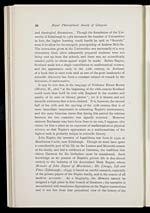John Napier (1550-1617)
Napier and the invention of logarithms
36
Royal Philosophical Society of Glasgow.
and theological discussions. Though the foundation of the Uni-
versity of Edinburgh in 1582 increased the number of Universities
to four, the higher learning could hardly be said to “flourish,”
even if we allow for the energetic principalship of Andrew Melville.
The instruction given in the Universities was necessarily of a very
elementary kind, since adequately prepared students were not
being sent up from the schools, and there was no scientifically
minded public to whom appeal might be made. Before Napier,
Scotland made not a single contribution to mathematical science,
and the appearance early in the 17th century, in Scotland,
of a book that at once took rank as one of the great landmarks of
scientific discovery has been a constant subject of remark by the
historians of mathematics.
It may be true that, in the language of Professor Hume Brown
(History, II., 280) “at the beginning of the 16th century Scotland
could more than hold its own with England in the number and
quality of its men of literary genius ”; yet it is literary and not
scientific eminence that is here claimed. It is, however, the second
half of the 16th and the opening of the 17th century that is of
more immediate importance in estimating Napier's environment,
and the same historian states that during this period the relation
between the two countries was signally reversed. However
eminent Buchanan may have been there is no one, I suppose, who
claims for him a place as an exponent of mathematical or physical
science, so that Napier's appearance as a mathematician of the
highest rank is probably unique in scientific history.
John Napier, the inventor of logarithms, was born in 1550, at
Merchiston Castle, near Edinburgh. Though he must have spent
a considerable part of his life on the Lennox and Menteith estates
of his family, and had a residence at Gartness, the tradition that
claims Gartness for his birthplace must be abandoned. Such
knowledge as we possess of Napier's private life is due almost
entirely to the industry of his descendant Mark Napier, whose
Memoirs of John Napier of Merchiston; His Lineage, Life and
Times (Edinburgh; 1834), is based on careful research, especially
of the private papers of the Napier family, and is the source of all
modern accounts. As a biography, the Memoirs cannot be
assigned a high place in that branch of literature; the narrative is
encumbered with wearisome digressions on the Napier connections
and is not free from that prejudiced view of the history of the


